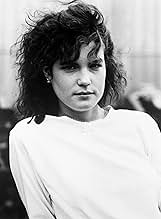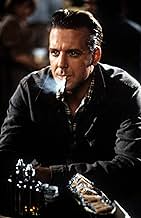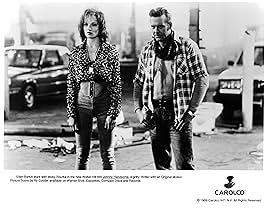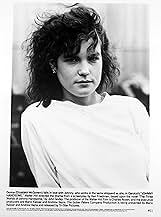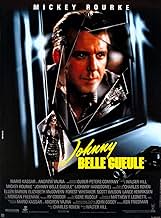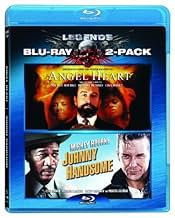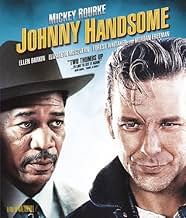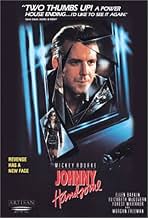VALUTAZIONE IMDb
6,1/10
11.617
LA TUA VALUTAZIONE
Dopo essere stato tradito e gettato in prigione, un gangster deforme ottiene un nuovo volto e viene riabilitato, ma il suo desiderio di vendetta incombe.Dopo essere stato tradito e gettato in prigione, un gangster deforme ottiene un nuovo volto e viene riabilitato, ma il suo desiderio di vendetta incombe.Dopo essere stato tradito e gettato in prigione, un gangster deforme ottiene un nuovo volto e viene riabilitato, ma il suo desiderio di vendetta incombe.
- Premi
- 4 candidature totali
Jeffrey Meek
- Earl
- (as Jeff Meek)
John P. Fertitta
- Prestige Salesman
- (as John Fertitta)
Edward Walsh
- Judge
- (as Ed Walsh)
Recensioni in evidenza
"Johnny Handsome" is a flawed but fascinating work from Walter Hill. Mickey Rourke is great as a deformed criminal who returns to avenge the people (Ellen Barkin and Lance Henriksen) who wronged him. The conceit of the premise is that Johnny's enemies will not see him coming with his new face, a face rebuilt after his ugly one was cut to pieces. Unfortunately, this potentially rich premise is quickly discarded and the film becomes a more standard crime yarn with a pointless love story thrown in. Johnny's love interest, Elizabeth McGovern, who was great in a similar role in "Racing With The Moon", is wasted and just doesn't belong in this material.
Lance Henriksen and Ellen Barkin are great as two of the oiliest lowlifes to impact with a movie screen in years. Barkin's pronunciation of the word "geek", when referring to Rourke's character, is hilarious, as is the crime couple's incessant badgering of each other. If the film had focused more on this duo and less on McGovern and another subplot involving Forest Whitaker, who is saddled with a dreadfully written role as a doctor who tries to help Johnny, it would have been a true contender.
The opening robbery scene is classic Hill -- brutal and economical -- and sets high expectations for the mayhem to come. Ry Cooder's slide guitar score is mesmerizing, and Mathew F. Leonetti's cinematography is moody and beguiling.
Ultimately, the film is a gritty pulp crime novel compromised by studio concessions. Which is such a crying shame.
Lance Henriksen and Ellen Barkin are great as two of the oiliest lowlifes to impact with a movie screen in years. Barkin's pronunciation of the word "geek", when referring to Rourke's character, is hilarious, as is the crime couple's incessant badgering of each other. If the film had focused more on this duo and less on McGovern and another subplot involving Forest Whitaker, who is saddled with a dreadfully written role as a doctor who tries to help Johnny, it would have been a true contender.
The opening robbery scene is classic Hill -- brutal and economical -- and sets high expectations for the mayhem to come. Ry Cooder's slide guitar score is mesmerizing, and Mathew F. Leonetti's cinematography is moody and beguiling.
Ultimately, the film is a gritty pulp crime novel compromised by studio concessions. Which is such a crying shame.
When I watched the movie Johnny Handsome, over again. I saw it from a whole new perspective. Other commentators that I've read here, looked at the movie only as to, character development, and ongoing plot continuity. They never looked at the movie as a human interest story! A glimpse into a possible life, lived in just the way it was presented! The story of a such a person, who may have actually lived, and who may have had the experiences that the character of John had, deformed as he was, and so may have had to re-acted in exactly the way he did? It's all the figment of some writer's imagination, but stretch your own mind enough to envelope this concept of this one man's life yourself? Saying Mickey Rourke cannot act, is a very short-sighted, and erroneous statement to make, after exploring the complexities of this character's existence overall. Mickey Rourke had the depth, and the finely tuned sensitivity, to convey the hopelessness of spirit, and also the continual confusion, of a totally scarred and horribly deformed, and therefore ugly and repulsive, singular human entity. John started out being socially unassertive,bereft of other contemporaries, visibly embarrassed, and yet, at the same time, pseudo-aggressive, and drawn to the criminal element. Understandably so, due to his low self-esteem, which is a by-product of his off-putting facial deformities. Mickey wore that face as if he truly had been born with it in reality. John's motivation, (for getting revenge on the two miscreants that had plotted against him, and his friend, in the robbery, and then killed his friend and wounded him), was the fact that, although he was hideous to the world at large, that one man had treated him as a person, a confidant, (due in part to John's unique skills), and befriended him, not as a horribly deformed freak, but as a peer, albeit, a peer in criminal activities. Even though, after his operation, John became a, "new man", just like everybody else, acceptable to the general population. This to the point of even attracting a "normal" caring woman to his new self. That wasn't enough to have changed his already well developed, "antisocial, unreasonable, and skewered" psyche. That part of him that would always be "unacceptable", in a so called "normal" world. So when the chance to avenge his only "true" friend, one who had included John (in his former incarnation), into his own bleak life routinely, how could John, with his scarred sensibilities, turn from the possibility of making a re-payment, he felt he "owed" this to Mikey? That alone would have driven John, at any cost, to figure out a way, in which ever way he could, to destroy the two characters, played so viciously and perfectly, by the actors Hendrikson, and Barkin. He fought their fire with his fire. Really this was the only way John knew, and the only option that was opened to him. A new face wouldn't have changed that. How could a person watching this movie expect rationality? I didn't comment on the Freeman character, Drones, because he just did what you would expect a cop to do. See a criminal, and try to find him doing something wrong. Then take him in. Freeman did this very accurately.He did his job, as usual. Still, the old adage applies here, with Mickey's character, John: Walk a mile in another's shoes before you judge him. I feel so sorry for people who watch movies with their mind, and leave their heart, and humanity completely out of it. They miss so much.
This is a minor Walter Hill film, partly redeemed by a couple of strong performances and an excellent score. Mickey Rourke (whose last good film perhaps this is) plays John Sedley /Johnny Handsome' and labours for the first part of the film under make up presumably inspired by the Elephant Man - as well as a handicapping mumble, recalling the actor's idol Marlon Brando. Hill, one time Peckinpah protégé, has seen better days with such films as The Warriors, 48 Hours, Streets of Fire etc, and here struggles to make a rather bald plot dynamic. Essentially it's a tale of crime gone wrong, betrayal, brooding and then final revenge, enlivened with rather peremptory love interest. The surgery side of the story, in which Sedley is miraculously remade into handsome Mickey Rourke, is no more than a detour from an underworld tale we've all seen before.
Hill characteristically provides memorable opening sequences for his films. This strength is apparent here, as details of the cast appear over the preparation for the initial robbery, cut together effectively and precisely. The director fades the colour on these opening planning scenes, and later also includes a brief and horrific flashback in black and white. There are two robberies in the film, central points about which much of the drama revolves, carried off with some flair by the participants and the editing department. There's something of the flair of Hong Kong crime cinema as the masked villains burst into shops and offices to make their killing'. Elsewhere things flag a little - especially in the unconvincing Sunny Rafe relationship, played respectively by an aggressive Ellen Barkin and the normally excellent Lance Henriksen. Sadly the character and motivations of the chief villain remains one-dimensional, and Rafe's bare-armed menace never rises above stereotype.
Sedley struggles to first rebuild his face, then his life, while courting the rather insipid Donna (Elizabeth McGovern) and hatching his master plan. Although his motivation for revenge is clear, in between surgery and larceny he rather languishes. Donna is a `nice girl': either naïve or forgiving, however one choses to see her, whose role in the final denouement is also deemed `nice work'. This vaguely pejorative epithet, as well as her ill-judged covering up for a former boyfriend, provide her character's most defining moments. Her presence fails to give Sedley the impetus he needs, and her final abduction is sadly predictable. The attempt to work up another major character, this time through the doctor-with-a-social-conscience who treats Sedley (a peculiarly be-whiskered Forest Whitaker) is only partially successful. After a brief couple of confrontations with the implacable, and splendidly named, police Lieutenant A. Z. Drones (Morgan Freeman), he disappears. On the plus side, Rourke gives a generally good performance, being especially affecting in the scene when he examines his new face. Despite the limitations of the script, and even with the affected mumble, the actor avoids dropping into bathos in this critical scene, actually convincing the viewer of his pleasure in his new identity. His convincing gratitude to those who have changed his appearance pays dividends at the end of the film, during his confrontation with the vengeful Rafe. Rafe's pummeling of Sedley's face and vicious attack on his newly-constituted features with a knife is truly disturbing, precisely because Rourke has so successfully communicated the humanity behind the criminal and surgical subject earlier.
As Drones (whose dogged perseverance reminds one of Inspector Javert in Les Miserables), Freeman is excellent. An actor whose distinctive tones and modulated performances give class to any film, he raises his part far above the lines he is given here, and goes a way in making up for weaknesses elsewhere. During his few prison scenes with Rourke, in fact, one can shut one's eyes listen to his voice, and summon up the much greater pleasures of The Shawshank Redemption (1994). It is he who recognises the reality at the centre of the film: that Sedley can change his appearance, but can never change what is inside of himself or where it will lead: ` I know what you are' he says to the felon at one point. `And we both know where you're going, don't we Johnny?' At the close of the film, after bullets have flown and dust settled, Sedly finally acknowledges this fact using an ironic phrase which implies both physical and moral assessment : `How do I look?'.
Fans of Rourke and Freeman will certainly want to see this film, although others will find there is rather less to it than meets the eye. Ry Cooder, a regular collaborator with the director, turns in a superb score full of slide guitar work, with dramatic bass lines for the action sequences. This makes one regret that the final package to which he contributed so valiantly is ultimately so unmemorable. Admirers of Hill, wanting to see one of his late urban thrillers with more interest, will be better off with Trespass of three years later.
Hill characteristically provides memorable opening sequences for his films. This strength is apparent here, as details of the cast appear over the preparation for the initial robbery, cut together effectively and precisely. The director fades the colour on these opening planning scenes, and later also includes a brief and horrific flashback in black and white. There are two robberies in the film, central points about which much of the drama revolves, carried off with some flair by the participants and the editing department. There's something of the flair of Hong Kong crime cinema as the masked villains burst into shops and offices to make their killing'. Elsewhere things flag a little - especially in the unconvincing Sunny Rafe relationship, played respectively by an aggressive Ellen Barkin and the normally excellent Lance Henriksen. Sadly the character and motivations of the chief villain remains one-dimensional, and Rafe's bare-armed menace never rises above stereotype.
Sedley struggles to first rebuild his face, then his life, while courting the rather insipid Donna (Elizabeth McGovern) and hatching his master plan. Although his motivation for revenge is clear, in between surgery and larceny he rather languishes. Donna is a `nice girl': either naïve or forgiving, however one choses to see her, whose role in the final denouement is also deemed `nice work'. This vaguely pejorative epithet, as well as her ill-judged covering up for a former boyfriend, provide her character's most defining moments. Her presence fails to give Sedley the impetus he needs, and her final abduction is sadly predictable. The attempt to work up another major character, this time through the doctor-with-a-social-conscience who treats Sedley (a peculiarly be-whiskered Forest Whitaker) is only partially successful. After a brief couple of confrontations with the implacable, and splendidly named, police Lieutenant A. Z. Drones (Morgan Freeman), he disappears. On the plus side, Rourke gives a generally good performance, being especially affecting in the scene when he examines his new face. Despite the limitations of the script, and even with the affected mumble, the actor avoids dropping into bathos in this critical scene, actually convincing the viewer of his pleasure in his new identity. His convincing gratitude to those who have changed his appearance pays dividends at the end of the film, during his confrontation with the vengeful Rafe. Rafe's pummeling of Sedley's face and vicious attack on his newly-constituted features with a knife is truly disturbing, precisely because Rourke has so successfully communicated the humanity behind the criminal and surgical subject earlier.
As Drones (whose dogged perseverance reminds one of Inspector Javert in Les Miserables), Freeman is excellent. An actor whose distinctive tones and modulated performances give class to any film, he raises his part far above the lines he is given here, and goes a way in making up for weaknesses elsewhere. During his few prison scenes with Rourke, in fact, one can shut one's eyes listen to his voice, and summon up the much greater pleasures of The Shawshank Redemption (1994). It is he who recognises the reality at the centre of the film: that Sedley can change his appearance, but can never change what is inside of himself or where it will lead: ` I know what you are' he says to the felon at one point. `And we both know where you're going, don't we Johnny?' At the close of the film, after bullets have flown and dust settled, Sedly finally acknowledges this fact using an ironic phrase which implies both physical and moral assessment : `How do I look?'.
Fans of Rourke and Freeman will certainly want to see this film, although others will find there is rather less to it than meets the eye. Ry Cooder, a regular collaborator with the director, turns in a superb score full of slide guitar work, with dramatic bass lines for the action sequences. This makes one regret that the final package to which he contributed so valiantly is ultimately so unmemorable. Admirers of Hill, wanting to see one of his late urban thrillers with more interest, will be better off with Trespass of three years later.
I really like this movie. Ellen Barkin's performance as a foul mouthed moll to Lance Henrickson's depraved killer club owner is striking. Even Mickey Rourke gives a true interpretation of the title character. Check out the scene where Johnny sees his completed new face for the first time, he captures the scene perfectly.
I pondered why Mickey agreed to do this movie. To work with the respected Walter Hill? Or because of the sincerity he saw in portraying a man resurrected? He plays his character with conviction, yet you know Handsome is emotionally wounded, a quality hard to project. You will be impressed by the film's monumental scene where Forest Whitaker reveals Handsome's new face, in turn revealing the jubilation he certainly has dreamt about his whole life. I believe that scene to be hallmark Mickey, very hard to mimic. He handles the role with a sensitivity you can believe about a man in his predicament. A good reason why casting is vital to a clichéd story! Walter Hill directs Mickey to his fullest. I also thought Liz McGovern to be a good choice as a clinging, excessive optimist with a heart for bad boys. It's a suitable choice that she's not lustfully beautiful- a regular, dull, secretarial girl puts the attention on Rourke, which would have detracted from the real element of the storyline had they cast a perfect 10. Freeman functions as a foil to the story and with a vintage performance of his obvious range.
Lo sapevi?
- QuizAl Pacino was initially interested in playing the title character, and worked with the producers on developing the script, but ultimately dropped out of the project, due to script problems. Pacino felt, despite numerous revisions, they had never been able to transcend the script's B-movie qualities.
- BlooperDuring the graveyard scene, Larry "pumps" the action on a double barreled shotgun.
- Citazioni
Vic Dumask: I don't know you, Mr. Mitchell. What can I do for you?
John 'Johnny Handsome' Sedley: A laundry service. Could be five million dollars worth.
Vic Dumask: That sounds illegal.
John 'Johnny Handsome' Sedley: [sotto voce] It is.
I più visti
Accedi per valutare e creare un elenco di titoli salvati per ottenere consigli personalizzati
- How long is Johnny Handsome?Powered by Alexa
Dettagli
Botteghino
- Budget
- 20.000.000 USD (previsto)
- Lordo Stati Uniti e Canada
- 7.237.794 USD
- Fine settimana di apertura Stati Uniti e Canada
- 2.437.642 USD
- 1 ott 1989
- Lordo in tutto il mondo
- 7.237.794 USD
- Tempo di esecuzione1 ora 34 minuti
- Colore
- Mix di suoni
- Proporzioni
- 1.85 : 1
Contribuisci a questa pagina
Suggerisci una modifica o aggiungi i contenuti mancanti

Divario superiore
By what name was Johnny il bello (1989) officially released in India in English?
Rispondi


